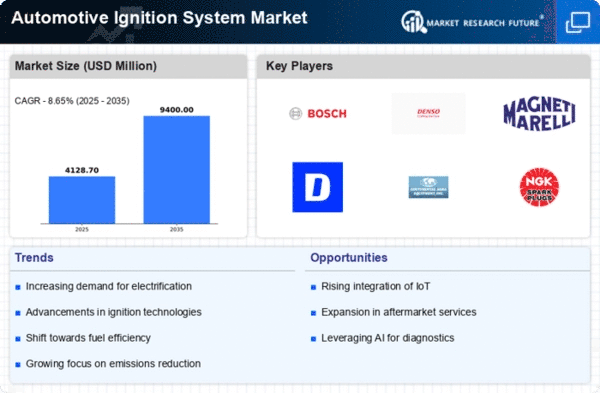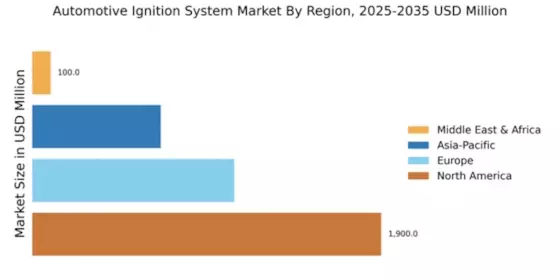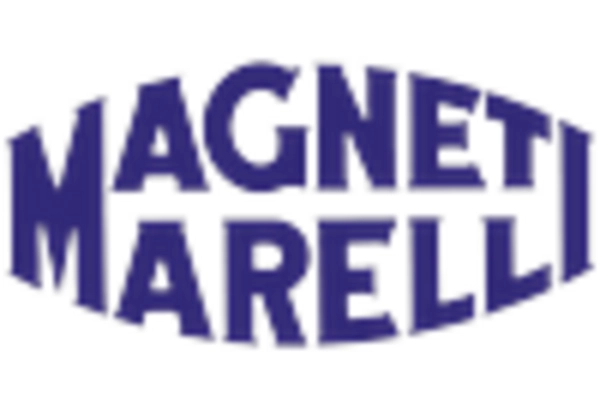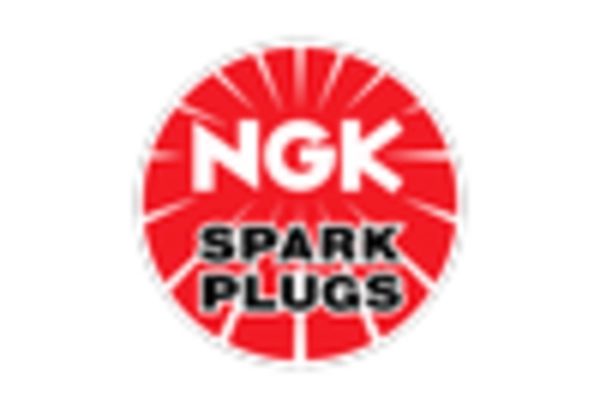-
Q2 2024: Bosch to invest $1 billion in new automotive ignition system plant in Mexico Bosch announced the opening of a new manufacturing facility in Mexico dedicated to advanced automotive ignition systems, aiming to meet growing demand from North American automakers.
-
Q2 2024: DENSO Launches Next-Generation Ignition Coil for Hybrid Vehicles DENSO introduced a new high-efficiency ignition coil designed specifically for hybrid vehicles, targeting improved fuel efficiency and reduced emissions for global automakers.
-
Q1 2024: BorgWarner Secures Major Ignition System Supply Contract with Stellantis BorgWarner announced it has been awarded a multi-year contract to supply advanced ignition systems for Stellantis’ next-generation internal combustion engine platforms.
-
Q2 2024: Valeo and Marelli Form Joint Venture for Smart Ignition Modules Valeo and Marelli revealed a new joint venture focused on developing and manufacturing smart ignition modules for electric and hybrid vehicles, aiming to accelerate innovation in powertrain electrification.
-
Q3 2024: Hitachi Astemo Opens R&D Center for Advanced Ignition Technologies in Japan Hitachi Astemo inaugurated a new research and development center in Japan to accelerate the development of advanced ignition technologies for both traditional and electrified powertrains.
-
Q2 2024: NGK Spark Plug Rebrands as Niterra and Launches Solid-State Ignition System NGK Spark Plug, now rebranded as Niterra, launched a new solid-state ignition system aimed at improving reliability and efficiency in next-generation vehicles.
-
Q1 2024: Delphi Technologies Wins Contract to Supply Ignition Systems for Renault’s New Engine Line Delphi Technologies secured a contract to provide ignition systems for Renault’s latest line of turbocharged gasoline engines, supporting the automaker’s push for lower emissions.
-
Q2 2024: Federal-Mogul Unveils High-Performance Ignition Module for Motorsport Applications Federal-Mogul launched a new high-performance ignition module designed for motorsport and high-performance vehicles, offering enhanced spark energy and durability.
-
Q3 2024: Magneti Marelli Expands Ignition System Production in Poland Magneti Marelli announced the expansion of its ignition system manufacturing facility in Poland to increase capacity and serve growing demand from European automakers.
-
Q2 2024: Continental Appoints New Head of Powertrain Division Continental named a new executive to lead its Powertrain Division, which oversees the company’s ignition system business, as part of a broader leadership restructuring.
-
Q1 2024: MSD Performance Launches Digital Ignition Controller for Aftermarket MSD Performance introduced a new digital ignition controller targeting the automotive aftermarket, offering tunable ignition timing and improved compatibility with modern engines.
-
Q2 2024: Valeo Receives Regulatory Approval for New Ignition System Technology in Europe Valeo announced it has received regulatory approval for its latest ignition system technology, enabling the rollout of its advanced ignition modules across European markets.
Covid 19 Analysis
The Covid 19 pandemic has negatively impacted the global automotive ignition system industry by restricting its sales turnover. As lockdown strict regulations had been introduced to curb the transmission of the virus, the mobility of people got diminished. It ultimately decreased the overall demand in the global automotive ignition system market setting. However, the market is expected to recover during the forecasted period due to eased restrictions and high awareness of sustainable mobility approaches.
Chief variables existing in the market
Several market drivers have contributed to the good performance of the automotive ignition system market, such as the increase in demand for vehicles using petrol engines, high-income level of people, and solid performance of the automobile market. These market trends could play a major role in influencing market performance during the forecasted period.
One of the major challenges in the global market revolves around the rising demand for electric and autonomous vehicles. These vehicles could diminish the demand for automotive ignition systems during the forecasted period. Another challenge in the market setting relates to the high level of competitive intensity. During the forecasted period, the market players need to deal with their rivals strategically so that they could capture a large portion of the automotive ignition system market share.
-
Opportunities in the global market
Several opportunities arise in the global market, such as the rising demand for vehicles at the global level and the introduction of new and strict environmental standards by various national governments. Business entities operating in the global automotive ignition system market setting could exploit these opportunities to create improved, sustainable, and environmentally friendly solutions for the intended market audience. Emerging markets such as India and China also create an opportunity for businesses to expand globally and offer their automotive ignition system solutions. Companies need to devise suitable strategies to address these challenges to capture a decent portion of the global market share.
In the global automotive ignition system market, several restraining factors exist that could limit the market's growth potential. A major restraint relates to the high cost associated with the development of innovative automotive ignition systems. Poor fuel efficiency is a major obstacle for organizations in the vast and dynamic market during the production stage. The lack of technically skilled personnel also poses a major shortcoming for businesses that effectively restricts their ability to function in the global automotive ignition system industry.
Cumulative evaluation of the market
The automotive ignition system market is highly dynamic. A diverse range of micro and macro variables exist in the market that influences the growth of the market and the performance of the key players. A critical assessment of the global market has been conducted, which has helped to identify the market drivers, restraints, challenges, and opportunities. The attractiveness of the market increases due to several critical market drivers, such as the surge in demand for petrol engine vehicles and the introduction of strict environmental guidelines in varying nations.
To optimally function in the promising global market, companies have been integrating digital technologies to make better and innovative offerings in the market.
Overview of the main market segments
The global automotive ignition system industry can be divided into conventional, electronic, and distributor-less types. The demand for the electronic segment has increased greatly as it can enhance the spark plug life by offering cleaner combustion. However, the conventional and electronic segments are likely to dominate the market and influence the future market of the automotive ignition system.
Based on the component, the global automotive ignition system market can be segmented into ignition coil, ignition switch, condenser, spark plug, ignition resistor, and others. These components play a distinctive role in influencing how ignition systems are used in diverse transportation applications. For instance, the ignition switch is responsible for starting the entire electric circuit by using a key. The spark plug also plays an integral role in improving the effectiveness of an engine's ignition system. The functionality of each of these components influences their demand in the global market domain.
Geographical regional analysis
The global automotive ignition system market can be segmented into Europe, North America, the Asia Pacific, and the rest of the world. In each regional segment, varying drivers exist that influence the performance of the automotive ignition system industry in the respective regions. In the past, the Asia Pacific segment has been acting as one of the major revenue generators of the market. Asian nations like India, Japan, and China are expected to influence the global market due to the rising demand for vehicles. North America and Europe are also expected to demonstrate good performance during the forecasted period.

















